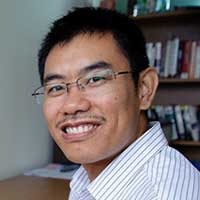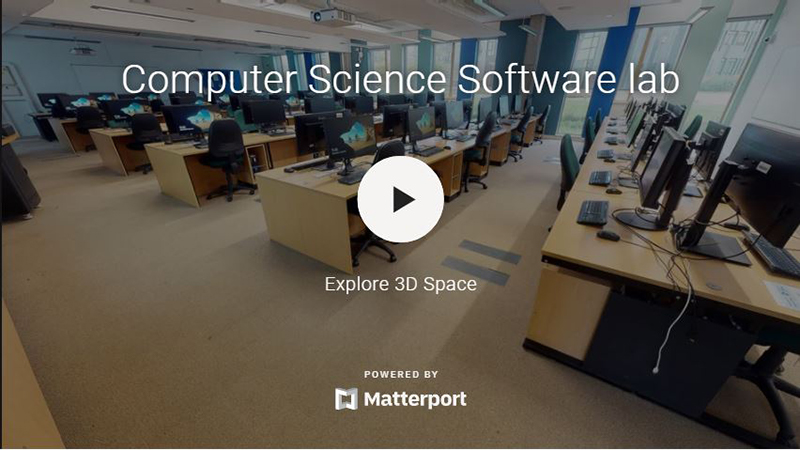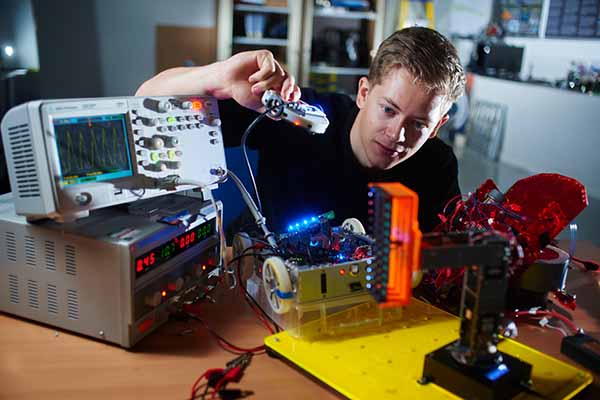
MSc Advanced Computer Science
Work at the cutting edge of advanced computer science to push boundaries and solve computing problems
Year of entry: 2026 (September)
The Advanced Computer Science Masters course will enable you to develop a high level of understanding and technical skill at the leading edge of the subject.
This course has been specifically designed to address the pace of change in this vibrant discipline by giving you breadth of knowledge in several areas, a range of advanced skills, and the expertise necessary to engage in work at the forefront of the application of computer science.
You'll gain experience of working as part of a highly-specialised research group through the individual project which is an integral part of the course.
This is a full-time, one year taught course, intended for students who already have a good first degree in computer science, software engineering or a closely related discipline, who would like to develop a deeper level of understanding and technical skill.
The course will build on your existing strong foundation in computer science. It will enable you to undertake more senior roles in the IT industry, engage in cutting-edge research and development or progress to a Computer Science PhD once you have successfully completed the course.
Our software labs offer 24/7 access for individual and group work. Software lab virtual tour
Course content
This course is heavily based on research, and all optional modules are led by academic staff who are active in that particular research area. The modules build upon the work currently being undertaken within the Department, connecting you directly to our research.
Industrial practice also strongly influences the content of our courses. We have active industrial partners to ensure that what you learn will be relevant and applicable to the workplace, once you leave the University.
You will benefit from free choice across all the modules, subject to prerequisites. You will also take a mandatory module on Professional and Research Skills. The course concludes with an individual research project.
Modules
Core modules
Option modules
You will study four option modules. Examples can be found below. Some option module combinations may not be possible. The options available to you will be confirmed after you begin your course.
- Autonomous Robots
- High-Integrity Systems Engineering
- Quantum Computing
- AI Search and Logic
- High-Performance Parallel and Distributed Systems
- Human Factors: Technology in Context
- Network Security
- Interaction Design and Evaluation
- Cryptography Theory and Applications
- Engineering 2: Automated Software Engineering
- Computer Vision and Graphics
- Evolutionary Intelligence
- Professional and Academic Development
- Cloud Based Data Analysis
- Governance of Data Science
Our modules may change to reflect the latest academic thinking and expertise of our staff, and in line with Department/School academic planning.
Dissertation
The dissertation will form part of the assessment of your research project. You will write a 50-page report.
You will have the opportunity to undertake an assessed individual research project as part of this course. This will take place over the summer semester and will be a culmination of the taught modules you have taken during the course, allowing you to focus on a specialist area of interest.
The project will give you an introduction to independent research, as well as providing the context of a research group working on topics that will be allied to your own. You will develop the skills and understanding in the methods and techniques of research in Computer Science.
In order to undertake the project you will be allocated a project advisor who will be a research expert and will guide you in your chosen area of interest.
Learning outcomes
Every course at York is built on a distinctive set of learning outcomes. These will give you a clear understanding of what you will be able to accomplish at the end of the course and help you explain what you can offer employers. Our academics identify the knowledge, skills, and experiences you'll need upon graduation and then design the course to get you there.
Learning outcomes for this course
- Apply advanced computational thinking to complex problems encountered, using skills in analysis, design and implementation of computing systems, drawing on the foundations of computer science and the state-of-the-art research literature.
- Apply specialist knowledge in areas, such as Interactive Technologies, to complete research and development tasks requiring knowledge beyond that typically acquired in a first degree in Computer Science.
- Identify, evaluate and summarise cutting-edge research literature and apply as relevant to project goals.
- Independently design and implement a significant and effective computing artifact to fulfil a research-led specification.
- Evaluate the merits and limitations of state-of-the-art, complex computational systems using clearly argued criteria.
- Produce and present accessible, detailed, accurate, concise accounts of sustained investigations, including illustrations and explanations of complex technical ideas, for professional audiences.
Fees and funding
Annual tuition fees for 2026/27
| Study mode | UK (home) | International and EU |
|---|---|---|
| Full-time (1 year) | £13,900 | £32,900 |
Fees information
UK (home) or international fees? The level of fee that you will be asked to pay depends on whether you're classed as a UK (home) or international student. Check your fee status.
Find out more information about tuition fees and how to pay them.
Additional costs
There are unlikely to be any mandatory additional costs associated with the course, although you may want to set aside £200 for optional photocopying and personal stationery over the duration of the course.
Funding information
Discover your funding options to help with tuition fees and living costs.
We'll confirm more funding opportunities for students joining us in 2026/27 throughout the year.
If you've successfully completed an undergraduate degree at York you could be eligible for a 10% Masters fee discount.
Funding opportunities
Chevening Scholarships
We are pleased to work with Chevening Scholars to offer funding for our Masters programmes. Chevening Scholarships provide one year of fully-funded postgraduate study in the UK for international (including EU) students. The scholarships are open to early and mid-career professionals who have the potential to become future leaders.
Teaching quality is excellent - it isn't text book oriented and it always encourages you to develop your understanding on a topic by reading journals and research articles.
Teaching and assessment
You’ll work with world‐leading academics who’ll challenge you to think independently and excel in all that you do. Our approach to teaching will provide you with the knowledge, opportunities, and support you need to grow and succeed in a global workplace.
Teaching format
Part of this course is taken up by taught modules. Each module comprises a mix of lectures, problem classes and practical classes, plus personal study time. In the second half of the course, you'll undertake an individual research project under the supervision of a member of staff.
Throughout the course you will have a personal tutor, who will provide academic and pastoral advice. When you undertake your individual project, you will be allocated a supervisor within your area of interest. The taught modules will take place in the first half of the course. You should expect to be working on open assessments during vacation periods.
Work on your individual project will start around the beginning of April, and you will receive regular one-to-one supervisions throughout your project. You will continue to work on your individual project over the summer, and there will be continuing supervision and research-group meetings to discuss your project. You will finish the course when you hand in your dissertation and paper for your project in September.
Due to the intensive nature of the course, you will need to be in York throughout both semesters and over the summer while you undertake your individual project.
Facilities
Built to the highest specifications, the Department is packed with cutting-edge facilities housed in a modern, self-contained building.
Our study and social pod is open 24/7 for group and individual study. It can also be booked for student society meetings and for events.
Find out more about our facilities, including a video tour, showing our labs, teaching and research spaces.
Teaching location
Computer Science is based on Campus East. The majority of teaching on this course takes place on Campus East in the Ian Wand building and Ron Cooke Hub.
About our campus
Our beautiful green campus offers a student-friendly setting in which to live and study, within easy reach of the action in the city centre. It's easy to get around campus - everything is within walking or pedalling distance, or you can always use the fast and frequent bus service.
Assessment and feedback
All the modules you take will be assessed, and we employ a variety of forms of assessment. These include practical exercises, reports and closed examinations. Your project assessment will be made up of a dissertation.
Assessments take place at various times during the year. Closed examinations are taken in the three week assessment periods that follow each semester.
Practical exercises, reports and other forms of open assessment are typically issued towards the end of the teaching sessions of a module. Work for these assessments must be submitted by fixed deadlines normally well after the conclusion of the taught sessions.
Careers and skills
The course is well-rounded and will allow you to gain an advanced knowledge of current Computer Science either across a wide range of topics or with a more specialist knowledge according to the specified themes. This will prepare you for either a career in research or more senior roles in industry.
Career opportunities
- Programming engineer
- Software developer
- Higher education teaching and research
- Information analyst and app developer
- Systems architect
- Business analyst
Transferable skills
- Apply advanced computational thinking to complex problems encountered.
- Apply specialist knowledge in areas, such as Interactive Technologies, to complete research and development tasks requiring knowledge beyond that typically acquired in a first degree in Computer Science.
- Identify, evaluate and summarise cutting-edge research literature and apply as relevant to project goals.
- Improved communication and organisational skills.
Entry requirements
| Qualification | Typical offer |
|---|---|
| Undergraduate degree | 2:2 or equivalent in Computer Science or a relevant discipline. Successful applicants will demonstrate a strong background in the following essential topics: programming, maths, software engineering and a knowledge of basic algorithms |
| Other qualifications and experience | We are willing to consider your application if you do not fit this profile, providing you are able to demonstrate that you have the required amount of Computer Science knowledge and experience to succeed on the programme. |
| Other international qualifications | Equivalent qualifications from your country |
English language
If English isn't your first language you may need to provide evidence of your English language ability. We accept the following qualifications:
| Qualification | Minimum requirement |
|---|---|
| IELTS (Academic and Indicator) | 6.5, minimum 6.0 in each component |
| Cambridge CEFR | B2 First: 176, with 169 in each component |
| Oxford ELLT | 7, minimum of 6 in each component |
| Oxford Test of English Advanced | 136, minimum 126 in each component |
| Duolingo | 120, minimum 105 in all other components |
| LanguageCert SELT | B2 with 33/50 in each component |
| LanguageCert Academic | 70 with a minimum of 65 in each component |
| Kaplan Test of English Language | 478-509, with 444-477 in all other components |
| Skills for English | B2: Merit overall, with Pass with Merit in each component |
| PTE Academic | 61, minimum 55 in each component |
| TOEFL | 87, minimum 21 in each component |
| Trinity ISE III | Merit in all requirements |
For more information see our postgraduate English language requirements.
If you haven't met our English language requirements
You may be eligible for one of our pre-sessional English language courses. These courses will provide you with the level of English needed to meet the conditions of your offer.
The length of course you need to take depends on your current English language test scores and how much you need to improve to reach our English language requirements.
After you've accepted your offer to study at York, we'll confirm which pre-sessional course you should apply to via You@York.
Next steps
Contact us
Get in touch if you have any questions

Department
Discover York










